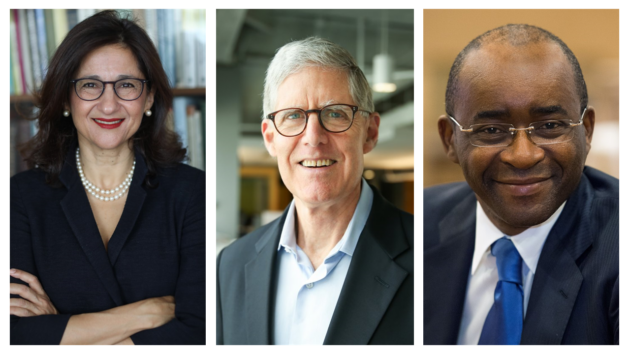
The Bill & Melinda Gates Foundation named the first members of its new board of trustees, appointing three outsiders to join its namesake co-chairs in overseeing one of the world’s largest philanthropies.
The announcement Wednesday is part of the Seattle-based foundation’s effort to reshape its governance following the divorce of Bill Gates and Melinda French Gates last year; billionaire businessman Warren Buffett’s decision to step down as a trustee last year; and the September 2020 death of Bill Gates Sr., who had been an honorary co-chair and key behind-the-scenes figure in the history of the foundation.
Appointed as trustees of the Gates Foundation were Strive Masiyiwa, who founded African telecommunications giant Econet; Baroness Nemat (Minouche) Shafik, director of the London School of Economics and Political Science; and Tom Tierney, former CEO of management consulting firm Bain & Company and co-founder of the philanthropic consulting firm Bridgespan Group.
Mark Suzman, who has been CEO of the 1,700-employee Gates Foundation for nearly two years, also joined the board as an ex-officio member, tied to his office as the foundation’s top executive.

In an interview with GeekWire this week, Suzman said the Gates Foundation sought trustees who had a familiarity with its work, expertise in its areas of focus, and who would be “genuinely strong and independent voices” on the board.
Masiyiwa, the African Union’s special envoy in charge of COVID-19 vaccine initiatives, has been especially critical of the Gates Foundation-backed COVAX initiative’s failure to meet its promises for vaccine distribution. The issue has been a stumbling block amid the Gates Foundation’s overall commitment of $2 billion to the global COVID-19 response.
The announcement of the new board members follows through on a broader plan announced by the Gates Foundation last year, including a contingency plan for Melinda French Gates to step down as co-chair and trustee if she and Bill Gates decide after two years that they can no longer work together as trustees.
Suzman said the Gates Foundation expects to name additional members to the board but decided to make this initial announcement in line with the timeline that it previously laid out.
Under the new structure, the Gates Foundation’s trustees will meet at least three times a year, with oversight and approval of the Gates Foundation’s annual budget and four-year plan.
Approval of any resolution will require the consent of a majority of the board and both co-chairs, Suzman said. In other words, a majority of the board cannot take action without the consent of both Melinda French Gates and Bill Gates, and neither co-chair can take action without the consent of the other co-chair and the majority of the board.
Previously, the board met only once a year and consisted of three members: Bill Gates, Melinda French Gates and Buffett, who has contributed $32.7 billion to the foundation.
The foundation says board members will be unpaid but can recommend a charitable gift from the foundation to a “qualified charity of their choice” up to $50,000 a year, in addition to reimbursement for reasonable travel costs and other expenses incurred in attending meetings and performing other foundation-related duties.
In conjunction with the announcement, Suzman issued the Gates Foundation’s inaugural annual letter, taking over what was previously an annual collaboration between Bill Gates and Melinda French Gates. Suzman wrote that 2022 marks “a pivotal moment” for the Gates Foundation and the world.
In addition to its direct impact measured in millions of lives lost, the pandemic has slowed, halted, and even reversed hard-won gains in global health and development .After nearly two decades of unprecedented progress, we have seen tens of millions of people thrown back into poverty, childhood vaccination rates drop, and diseases from malaria to tuberculosis resurge. All of this has been exacerbated by climate change, which has been especially hard for the rural poor who depend on agriculture for food and income. And in the United States, we’ve seen massive setbacks in education due to the pandemic, with the impact falling hardest on Black, Latino, and low-income students.
Meanwhile, income and wealth inequalities continue to grow, and this has contributed to increased scrutiny of the very wealthy and skepticism about the motives and role of philanthropy.
At a time of such profound challenges,we must ask ourselves: What is the role and value of a foundation like ours relative to governments, the private sector, and civil society around the world. How should we be measured and evaluated? How can we better hold ourselves accountable and make sure our contribution is additive and complementary to that of others?
Suzman called the appointment of the new trustees “an important milestone in how we answer that last question.”



